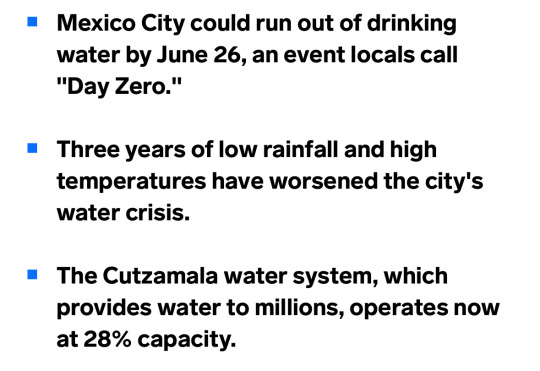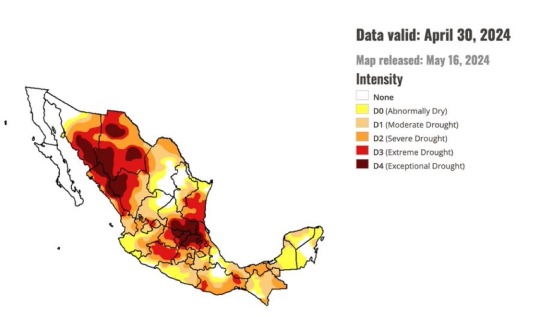#Environment news
Explore tagged Tumblr posts
Text
#Breaking news#Latest news#Top stories#Headlines#Current events#News updates#Trending news#World news#Local news#News today#Live news#24-hour news#Global news#News alerts#Daily news#Specific News Categories:#Politics news#Economy news#Technology news#Health news#Sports news#Entertainment news#Celebrity news#Science news#Weather news#Business news#Crime news#Education news#Environment news#Travel news
3 notes
·
View notes
Text
I think I’ve signed maybe three petitions in my life but I also think this one is pretty important.
I also think it’s kind of sketchy that I haven’t heard about it until today. 


tl:dr
American government wants to pepper Alaska with drills to mine a huge load of oil at the expense/harm of our climate. Millions of metric tons of CO2 into the air. Very bad. Do not want.
…how badly do they have to harm the planet over a finite resource before it’s too late? This country wants my generation to have kids but then pushes shit like this?
This is exhausting.
#willow project#climate politics#petition#activism#sharing the word#environment news#god im so tired
4 notes
·
View notes
Text
https://english.radio.cz/beavers-build-planned-dams-protected-landscape-area-while-local-officials-still-8841536

A beaver colony in the Brdy region has gained overnight fame by building several dams in the Brdy protected landscape area, creating a natural wetland exactly where it was needed. It saved the local authorities 30 million crowns, and has the public cracking jokes about public administration and red tape.
The administration of the Brdy protected landscape area, which had gained approval for the 30 million crown project, was dealing with red tape and seeking the respective building permits from the Vltava River Basin authorities when the dam project was completed almost overnight by a local colony of beavers.
They could not have chosen their location better –erecting the dams on a bypass gully that was built by soldiers in the former military base years ago, so as to drain the area. The revitalization project drafted by environmentalists was supposed to remedy this. Bohumil Fišer, head of the Brdy Protected Landscape Area Administration says Nature took its course and the beavers created the necessary biotope conditions practically overnight.
#good news#beavers#brdy#beaver#ecosystem engineers#environmentalism#science#environment#nature#animals#Czech Republic
23K notes
·
View notes
Text
We have already averted truly apocalyptic levels of global warming.
Yes, read that again. Let it sink in. This is what the science now says. We have already averted truly apocalyptic global warming.
To quote David Wallace-Wells, author of The Uninhabitable Earth, from his huge feature in the New York Times:
"Thanks to astonishing declines in the price of renewables, a truly global political mobilization, a clearer picture of the energy future and serious policy focus from world leaders, we have cut expected warming almost in half in just five years... The window of possible climate futures is narrowing, and as a result, we are getting a clearer sense of what’s to come: a new world, full of disruption but also billions of people, well past climate normal and yet mercifully short of true climate apocalypse." (New York Times, October 22, 2022. Unpaywalled here. Emphasis mine. And yes, this vision of the future is backed up by the current science on the issue, as he explains at length in the article.)
So we've already averted truly apocalyptic warming, and we've already cut expected warming IN HALF in just the past five years.
The pace of technology, of innovation, of prices, of feasibility, of discovery, of organizing, of grassroots movements, of movements in other countries around the world, have all picked up the pace so fast in the last five years.
Renewable technology and capacity are both increasing at an exponential rate. It's all S-curves, ones that look like this:

-via The Economist, June 20, 2024.
How much more will we manage in another five years? Another ten? Another twenty?
I know the US is about to fucking suck about the environment for the next four years. But the momentum of renewable energy is far too much to stop - both in the US (x) and around the world.
(Huge shoutouts to India, China, and Brazil for massive gains for the environment in renewables, and Brazil for massive progress against Amazon deforestation.)
We're going to get there.
Say it with me. We're going to get there.
#me#made this it's own post separate from the stuff about dystopia#bc the literary theory side was important framing to me but it also kind of buries the lede#global warming#climate crisis#climate change#climate catastrophe#climate action#environment#climate anxiety#good news#hope
17K notes
·
View notes
Text

https://www.nytimes.com/2024/12/30/opinion/climate-change-news-coverage-2025.html?unlocked_article_code=1.lk4.2aBH.Eu2JvqLwBjk2&smid=nytcore-ios-share&referringSource=articleShare&tgrp=on
(Lots of annotated links for environmental news inside this article)
0 notes
Text


Source


Source
#environment#Mexico#news#climate change#government#the left#progressive#twitter post#activism#current events#drought#environmentalism
28K notes
·
View notes
Text
youtube
Watch the 2024 American Climate Leadership Awards for High School Students now: https://youtu.be/5C-bb9PoRLc
The recording is now available on ecoAmerica's YouTube channel for viewers to be inspired by student climate leaders! Join Aishah-Nyeta Brown & Jerome Foster II and be inspired by student climate leaders as we recognize the High School Student finalists. Watch now to find out which student received the $25,000 grand prize and top recognition!
#ACLA24#ACLA24HighSchoolStudents#youtube#youtube video#climate leaders#climate solutions#climate action#climate and environment#climate#climate change#climate and health#climate blog#climate justice#climate news#weather and climate#environmental news#environment#environmental awareness#environment and health#environmental#environmental issues#environmental education#environmental justice#environmental protection#environmental health#high school students#high school#youth#youth of america#school
23K notes
·
View notes
Text
1 note
·
View note
Text
The Climate Change Superfund Act makes major fossil fuel companies financially liable for damage due to extreme weather events and other dangers related to climate change. The amount these companies are responsible for paying depends on their contributions to emissions since 1995.
Money collected from fossil fuel companies will be used to mitigate the health impacts of climate change and improve public infrastructure.
#climate change#climate anxiety#good news#politics#environment#fossil fuels#greenhouse gasses#fossil fuel companies#law#environmental anxiety#hope
7K notes
·
View notes
Text
2024 on track to be hottest year on record, says latest C3S report
The first half of 2024 has experienced unprecedented heat, setting the year on a trajectory to potentially become the hottest on record. According to the European Union’s Copernicus Climate Change Service (C3S), in its monthly report said that all six months (2024) have surpassed pre-industrial temperature averages by at least 1.5°C. This significant warming raises alarms about nearing climate…
#Climate Change#Copernicus Climate Change Service#enviornment#Environment News#Featured#Global Warming#Hottest year#June#News#News Of The World#temperature
0 notes
Text

11K notes
·
View notes
Text
#Latest news#Breaking news#News updates#News today#Top stories#Trending news#Headline news#World news#Local news#News alerts#News live#2. Specific News Categories:#Politics news#Economy news#Health news#Science news#Technology news#Business news#Entertainment news#Sports news#Education news#Environment news#International news#Crime news#3. Current Events and Issues:#Global news#Election news#Weather news#Natural disasters#Social justice news
1 note
·
View note
Text

he was worrying this coat like a pitbull while everyone cheered
#belphegor#the people love his antics!!#he was so happy this weekend#zero stress from travelling and being in a new location with new people#bc he's a social butterfly who thrives in a loud chaotic environment#the least cat-like cat I've ever met
3K notes
·
View notes
Text
#!!!!!#great white shark#sharks#shark pups#good news#environmentalism#science#environment#nature#animals#conservation#nyc#new york#new york city#usa#ocean life#marine life#sea life
31K notes
·
View notes
Text
"A tribal-led nonprofit is creating a network of native bison ranchers that are restoring ecosystems on the Great Plains, restoring native ranchers’ connections with their ancestral land, and restoring the native diet that their ancestors relied on.
Called the Tanka Fund, they coordinate donors and partners to help ranchers secure grazing land access, funds needed to install and repair fencing, increase their herd sizes, and access markets for bison meat across the country.
That’s the human part of the story. But as Dawn Sherman, executive director of the Tanka Fund, told Native Sun News, they’re “buffalo people” and these four-legged, 2,000 lbs. “cousins” are equal-part-protagonists.
The return of the bison means the return of the prairie, one of the three great grassland ecosystems on the planet, of which just 1% remains as it was when the Mayflower arrived.
“Bringing buffalo back to their ancestral homelands is essential to restoring the ecosystem. We know that the buffalo is a keystone species,” said Dawn Sherman, a member of the Lakota, Delaware, Shawnee, and Cree.
“Bringing the buffalo back to the land and to our people, helps restore the ecosystem and everything it supports from the animals to the plants to the people. It’s come full circle. That’s how we see it.”
As Sherman and the Tanka Fund help native ranchers grow their operations, everyone is well aware of the power of the bison to transform the environment: just as nations across Europe are, who are reintroducing wood bison to various ecosystems, for all the same reasons.
Sherman points out the variety of ways in which buffalo anchor the prairie ecosystem. The almost-extinct black-footed ferret, she points out, lived symbiotically with the bison, and with the latter gone, the former followed—nearly.
The long-billed curlew uses bison dung as a disguise to hide nests from predators. Deer, pronghorn antelope, and elk all rely on bison to plow through deep snows and uncover the grasses that these smaller animals can’t reach.
Everywhere the bison hurls its massive body, life springs in the beast’s wake. When bison roll about on the plains, it creates depressions known as wallows. These fill with rainwater and create enormous puddles where amphibians and insects thrive and reproduce. Certain plants evolved to grow in the wet conditions of the wallows which Native Americans harvested for food and medicine.
Native plants evolved under the trampling hooves of millions of bison, and that constant tamping down of the Earth is a key necessity in the spreading of native wildflower seed.
Indeed, Sherman says some of these native ranchers are bringing bison onto lands still visibly affected by the Dust Bowl, and already the animals are acting like a giant wooly cure-all for the land’s ills.
Since 2020, the Tanka Fund, in partnership with the Inter-Tribal Buffalo Council and the Nature Conservancy, has overseen the transfer of 2,300 bison from Nature Conservancy reserves to lands managed by ranchers within the Tanka Fund network.
“[T]he more animals that we can get the more of that prairie we can restore,” said Sherman. “We can help restore the land that has been plowed and has been leased out to cattle ranchers.”"
youtube
-Article via Good News Network, February 13, 2025. Video via Tanka Fund, July 17, 2024.
#indigenous#indigenous peoples#first nations#native americans#bison#ecology#ecosystem#ecosystem restoration#keystone species#endangered species#environment#prairie#great plains#land back#good news#hope#Youtube
9K notes
·
View notes